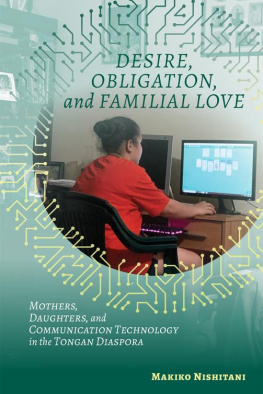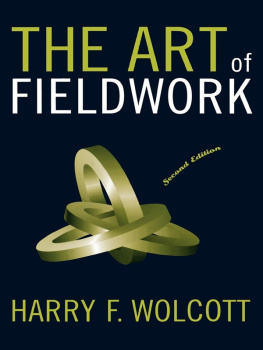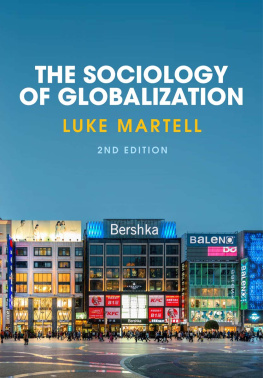PREFACE TO THE SECOND EDITION
This new edition offers a view of migration, globalization, and ethnographic fieldwork over thirty years. It does not alter earlier versions of this book but rather adds fresh perceptions and narratives in a new final section, V: Revisiting Globalization. The new section, divided into three chapters, is based on two more visits to Tonga and to California in 2010, along with experiences and interactions over the past fifteen years since the last edition was written. There is more on how this edition came about on pages 217219, which introduce the new chapters.
I dedicate this edition to my loving father, who has always been a wonderful support and example for me in life. He died while I was in Tonga, and I am grateful to my Tongan family who helped me mourn.
ACKNOWLEDGMENTS
This book was a product of the efforts of friends and neighbors, family and colleagues. Helpful suggestions, copyediting, and proofreading, and thoughtful advice came from many sources: Anne Bromley, a poet; Jim Wilce, a linguistic anthropologist, Grace Everding, a neighbor and English teacher; Joseph Boles, a Womens Studies director; Edwina Small, my mother; Barbara Dapcic, a medical anthropologist; and Doug Duncan, a masters student in anthropology. I am thankful to Fran Benson at Cornell University Press for subtitling this book and for being the responsive and caring professional that she is.
To the villagers of Olunga, I owe my deep gratitude for your many years of patience and kindness. To my Tongan family and informantswhose names I cannot offerthank you for taking this work so seriously and making the time to read and correct chapters of this book. My partner, who spent more than a year doing all our housework and putting up with my hermitage, allowed me the uninterrupted peace to write.
Thanks to all of you.
C. A. S.
Acknowledgments to the Second Edition
The second edition would not be possible without the support and generosity of my Tongan family, who allowed me to share the details of their lives in the belief that their stories will teach, record, and preserve insights worth knowing, now and in the future. Thanks to Claudia Bakula and Dr. Luana Uluave, who both offered encouragement and helpful suggestions for this volume. I am indebted once again to Fran Benson, my editor at Cornell University Press, whose competence, calm, and vision makes it easier to be an author.
I
DEPARTURES
It is 1967. A teacher born in a thatched hut says a teary good-bye to her parents and eleven siblings. She will board an airplane and leave her island home for the first time. Her destination: the United States, where she will find work as a maid. In New York, in 1981, a student anthropologist boards another plane to go study gender and womens organizations in a village on an island in the South Pacific. She will collect data over three years for a book she will never write. Several years later a man from the outskirts of Salt Lake City loads a pony into a trailer and drives it to a family who arranged to buy the animal for their daughters birthday. In front of the shocked seller, the pony is clubbed to death, and it becomes part of the feast to celebrate the childs birthday. The seller calls the police, and the incident appears as a small human interest item in the Wall Street Journal.
These three travelers, from different places and times, and with different purposes, are all on the same voyage. It is about this voyage that this book was written.
The pages that follow describe the pattern of global migration that is transforming the world. They could have been written only at this time, at the end of the twentieth centurya century that began with 70 percent of the worlds peoples living in colonies and protectorates. As the century ends, 80 million migrants worldwide, many from these former colonies, are changing the face of the agricultural countries they left behind and the industrial countries to which they are turning. This diaspora is changing all our lives, our relationships, and our futures in ways that we may not even yet be aware of.
This book tells a global story that begins in an unlikely place: in a village on the main island of a country called Tonga, the only remaining independent kingdom in the South Pacific. Tonga is a small island nation of about 100,000 people, mostly farmers and fishermen. In the mid-1960s, after three thousand years in their island home, Tongans began leaving their villages and migrating to New Zealand, Australia, and the United States. What began as temporary migration in search of work and education steadily became permanent. By the mid-1980s, the overseas Tongan population was equal to one-third of the population of Tonga, and by the first years of the twenty-first century there will be more people of Tongan descent living outside Tonga than in Tonga itself. In the United States, many Tongans have settled in northern California, becoming part of Americas new immigrant wave.
I tell a story of international migration through the eyes and lives of Tongan migrants. I open in Part I, Departures, with a look at Tongan village life, showing what would prompt people to leave a place where starvation and homelessness are virtually absent and tradition and family are strong.
In Part II, Arrivals, I then follow the first migrants in one Tongan family from their island home to their new home in northern California. You will hear of their first days in the United States, then see their lives twentyfive years later in a suburb of San Francisco, where they have raised their two American-born children. You will then meet another branch of this same familywho remained in Tonga for the same twenty-five yearsand follow their journey in the 1990s from a Tongan village to an American suburb. You will hear from two sisters in this family, one who migrated and one who did not, and they will talk candidly about their lives and life decisions. In Part II, you will meet Palu, the one who migrated, and see her evolving view of herself as she becomes an American.










